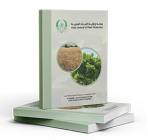H.R.D. Al-Aboudi* and F.A. Al-Rikabi
Department of Plant Protection, College of Agriculture, University of Kufa, Iraq.
*Email address of the corresponding author: [email protected]
Pages 113-125
A Regional Scientific Journal Published Four Times a Year by the Arab Society for Plant Protection


H.R.D. Al-Aboudi* and F.A. Al-Rikabi
Department of Plant Protection, College of Agriculture, University of Kufa, Iraq.
*Email address of the corresponding author: [email protected]
Pages 113-125
This study investigated the susceptibility of 30 potato varieties to soft rot disease caused by the bacterium Enterobacter cloacae and its effect on the starch, potassium, and ascorbic acid content of tubers. The results obtained showed that the Elmundo variety was the most susceptible to the disease, with the diameter of inhibition zone reaching 8.90 cm within 6 days, followed by the Burren variety (7.87 cm), with a significant difference to all other varieties. The varieties most resistant to bacterial soft rot disease were Lady Rositta and Amarin, with a significant difference from all other tested varieties, as the inhibition zone reached 0.33 and 0.37 cm, respectively. The results obtained also showed that the tubers of the “Lady Rositta” variety were significantly superior in starch content, which reached 23.02%, whereas the lowest starch content was in the “Donata” variety, which reached 4.52%. The “Universa” potato variety had significantly the highest potassium content, which reached 4.645%. The “Lady Rositta” potato variety had the highest ascorbic acid content, which reached 0.84%, with a significant difference from all other varieties. The “Fandango” variety had the lowest content of ascorbic acid of 0.06%. Increase in starch, ascorbic acid and potassium content in the tubers has a role in giving their cell walls strength and rigidity and make them resistant to infection with bacteria that cause the soft rot disease. In addition, potassium is an important nutrient for plant growth in general and has a major role in increasing the thickness of the cell wall, which makes the latter resistant to harsh conditions.
Potato, soft rot, starch, potassium, ascorbic acid, Enterobacter cloacae.

